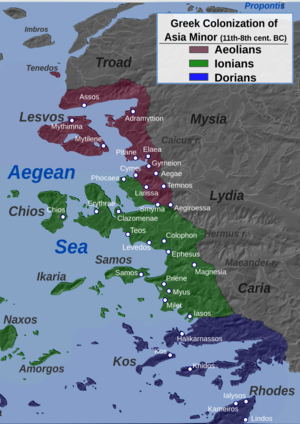Ionian school (philosophy) facts for kids
The Ionian school was a group of very early Greek thinkers who lived in a region called Ionia around the 6th century BC. This area was in what is now modern-day Turkey. These philosophers were the first in the Western world to try and understand the world around them using logic and observation, instead of just relying on myths and stories about gods.
Important thinkers from the Ionian school included Thales, Anaximander, Anaximenes, Heraclitus, Anaxagoras, and Archelaus. A famous Greek thinker named Aristotle called them physiologoi, which means "natural philosophers." This is because they studied nature and tried to figure out how everything worked. They were also sometimes called cosmologists because they looked at the stars and tried to understand the universe.
The first three philosophers – Thales, Anaximander, and Anaximenes – all came from the city of Miletus in Ionia. They are often called the Milesian school. These thinkers wanted to find the basic element or "stuff" that everything in the world was made of. They believed that even though things could change form, there was one main thing that stayed the same. They used careful thinking, not religion or mythology, to come up with their ideas. This is why they are seen as the very first philosophers!
Contents
Thales: The First Philosopher
Thales of Miletus lived from about 624 BC to 546 BC. Many people consider him the very first Western philosopher. Before Thales, Greeks explained things like lightning or earthquakes by saying gods caused them. But Thales wanted to find natural reasons for these events. He thought that the Earth floated on water, and that earthquakes happened when waves rocked the Earth.
Thales' Big Idea: Water is Everything
Thales' most famous idea was that water was the basic element of everything. He believed the world started from water.
Aristotle, another famous philosopher, wrote about Thales' ideas. He said Thales might have thought this because all living things need moisture to grow. Also, seeds, which start new life, are moist. So, for Thales, water was the main building block of nature.
Anaximander: The Unlimited Beginning
Anaximander (around 610 BC to 546 BC) was another important philosopher from Miletus. He wrote about how the universe began.
Anaximander's Idea: The Apeiron
Anaximander believed that the very first thing, the "beginning" of everything, was an endless and unlimited mass. He called this the apeiron. This apeiron never got old or decayed. Instead, it constantly created new materials from which everything we see in the world came from.
Anaximenes: The Air of Life
Anaximenes of Miletus (around 585 BC to 528 BC) was also from Miletus. Like the others in his group, he looked for a single basic element for everything.
Anaximenes' Idea: Air is the Arche
Anaximenes believed that air was the main element, or arche, from which everything else came. He thought that air could become different things by getting thinner or thicker. For example, when air got thinner, it became fire. When it got thicker, it became wind, then clouds, then water, and finally earth and stones.
Heraclitus: Everything Changes
Heraclitus of Ephesus (around 535 BC to 475 BC) had different ideas from Thales and Anaximander. He thought that the basic element of everything was fire.
Heraclitus' Idea: Constant Change
Heraclitus believed that everything in the world was always changing. He famously said: "Everything flows, nothing stands still." He also said: "No man can cross the same river twice, because neither the man nor the river are the same." This means that both the person and the river are constantly changing, so it's never truly the same experience. For Heraclitus, change was real, and stability was just an illusion.
Anaxagoras: Mind Orders All
Anaxagoras of Clazomenae (around 510 BC to 428 BC) had a different view on what things were made of.
Anaxagoras' Idea: Many Elements and Cosmic Mind
Anaxagoras thought that everything was made of an endless number of tiny, unchanging basic elements. He believed that things came into being when these elements mixed together, and they disappeared when they separated. He also introduced the idea of a "cosmic mind" or nous. This mind was a powerful force that organized and ordered all the different substances in the universe.
Archelaus: Socrates' Teacher?
Archelaus was a Greek philosopher who lived in the 5th century BC. He was a student of Anaxagoras. Some people, like Ion of Chios, believed that Archelaus was even the teacher of the very famous philosopher Socrates.
Archelaus' Ideas: Back to Basics
While Archelaus generally followed Anaxagoras' ideas, he also looked back to the earlier Ionian philosophers in his thoughts about the universe. He tried to connect the ideas of his teacher with the older ideas of the Ionian school.
See also
- History of naturalism
- Mechanism (philosophy)
External links
de:Ionische Naturphilosophie Escuela jónica zh:爱奥尼亚学派
 | Frances Mary Albrier |
 | Whitney Young |
 | Muhammad Ali |


